DramaticPopcorn
Guest
Well as usual, trailer says shit all.
![The Year of Incline [2014] Codex 2014](/forums/smiles/campaign_tags/campaign_incline2014.png)
GRAND STRATEGY, ON A UNIVERSAL STAGE
Discover new solar systems and make first contact with the universe
RICH INTERGALACTIC EXPLORATION
Something’s out there – and nobody knows what it is yet. Enormous, procedurally generated star systems ensure that every game will begin with a trip into the vast unknown, and the discovery of new worlds
ICONIC PARADOX DIPLOMACY AND STORYTELLING
Explore the stars as one of several playable races with unique traits and skills. Meet an incredible number of random species – all potential allies or emerging threats
DEEP AND DYNAMIC WARFARE SYSTEM
Defend your star-spanning empire with customized, user-designed ships, and repel attacks (or conquer lesser species) in rich, challenging battles with gorgeous, top-of-the-line visuals



Rock Paper Shotgun preview
Honestly, assuming they can actually deliver on what they're promising, this sounds amazing.
This is paradox, they can't get working hoi 4, MM and other cold war game was axed, hold your horses, don't forget that basing on current release plan it will be out in 2 years atleast.
How many games paradox is working on at the same time? CK 2, EU 4 , HOI 4 and now this.
Seems too much.
this scares me. i want it to be a complex game, more complex than eu but not needlessly complicated and convoluted as ck2.most accessible game yet (easier to pick up than EU4 and CK2)

Has Paradox ever gotten something right version 1?
I'm waiting on Stellaris 2.

Will this be TB or RT?
Paradox’s Space Strategy Game Stellaris Has Won Gamescom
Paradox’s internal development studio, responsible for Crusader Kings, Europa Universalis,Victoria and Hearts of Iron, is deep into development on a space strategy game. We’ve already seen it, and picked the brains of CK II maestro and project lead Henrik Fåhraeus and EU IV designer Tomas Johansson about this giant leap for the studio. The project, which the company announced at their Gamescom fan gathering moments ago, goes by the name Stellaris and it’s shaping up to be one of the most exciting games in recent years.
Below, you’ll find everything we know, including how randomised alien species will ensure that each new galaxy is mysterious, and why the commitment to an intelligent and subversive end-game could make this one of the smartest interpretations of 4X strategy ever made.
The finest summary of Stellaris’ aims came mid-way through the half hour presentation and discussion in which Fåhraeus and Johansson unveiled the game. “We’re not creating one specific universe. It can be any sci-fi universe.” Johannson was referring to the way in which the procedural galaxies are more than a collection of planets and stars. By the late game you might find that one of your science ships has become the Event Horizon, ripping a hole in reality to a dimension of horrors. Before you know it, you’re scrabbling to militarise in order to survive a fight against invaders from beyond and you’ve accidentally fallen into Warhammer 40K.
Or maybe you train the world’s greatest scientist-adventurers, create the most advanced ships in the universe, and set up silent listening posts on the moons orbiting planets that are home to pre-spacefaring species. You can learn from them, guide them and eventually become their patrons. You are a Banksian Culture.
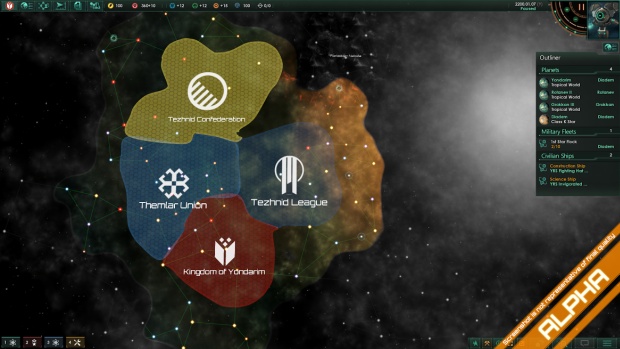
Perhaps you’ll direct your energies toward the founding of a galactic federation and create an alliance of species working together toward a greater good. You can even identify named characters within that galaxy and find your Kirk and Spock. That same federation might become something else entirely if its utopian vision involves the use of robotic workers, allowing the sentient population to live in luxury, philosophising and creating art rather toiling in factories and fields. Eventually, the push for greater and greater AI makes a Cylonesque uprising a distinct possibility.
The important word is ‘possibility’. In Stellaris, many things are possible but few things are hardcoded into the story of a new galaxy. Your actions and reactions to the mysteries and wonders that you encounter will help to determine the fate of your species and the others that you share the galaxy with, and even as you work toward your own goals, one of the other interstellar empires is likely to be meddling with technologies that threaten the balance of power and the equilibrium of reality.
It’s not only the large, game-changing events that can happen that set a new galaxy apart. They can contain up to a thousand systems but it’s what exists on those planets and between those stars that makes each playthrough unique. Every alien species that you encounter will be unique to your game, concoted from a long list of physical traits and social behaviours. You might discover a civilisation of aggressive, xenophobic moluscoids or an isolationist avian race who breed quickly and travel through the warp, spreading rapidly and unpredictably from planet to planet.
Each race will be represented by one of around a hundred animated portraits, ranging from humanoid faces to tentacled maws. They’re beautifully illustrated and the entire game is the most attractive Paradox grand strategy title to date by some distance. Rotating the map, it’s possible to create striking images of systems, fleets and alien void-dwellers, and I was surprised to learn that this is yet another appearance of the Klauswitz engine, which drives the current generation of Paradox strategy.
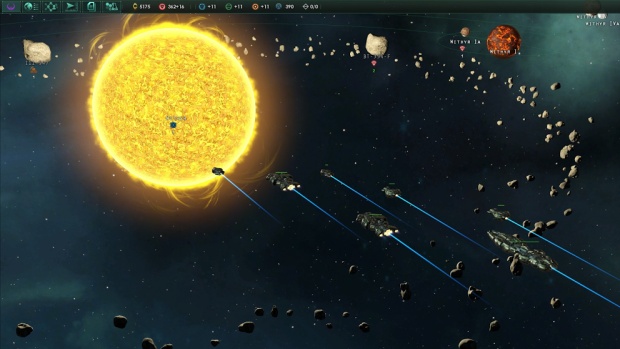
Although they’ll have distinct behaviours, every race starts in a similar position. They’re all on the cusp of their first faster-than-light journeys into the unknown and, in a departure from previous Paradox grand strategy games, the start points are not asymmetrical. There is no equivalent of the Holy Roman Empire, already a major player in the galaxy and difficult to control or overthrow. Everyone, whether human player (the game supports as many as a new map can comfortably contain) or AI, begins with a home planet and the itchiest of feet (or psuedopods). In the early stages, as is traditional in the genre, you’ll concentrate on exploration and colonisation.
As with every other part of the game, traditions are swiftly abandoned. Planetary management involves shifting civilians from one tile to another to gather the resources needed. Buildings enjoy adjacency bonuses if placed next to similar structures. So far, so familiar. The introduction of blocker tiles complicates matters slightly. An otherwise desirable piece of land might contain dangerous wildlife that must be cleared out and a random event might cause that wildlife to spread across the planet. Or a giant sinkhole might open up, requiring specific tech to seal it so that the land can be reclaimed. Worse still, interfering with that sinkhole might interrupt a subtarranean race, leading to an invasion from the depths.
Further still, an unhappy population, or one simply reacting to the changing state of play, might push for a change in government or splinter into factions. A common theme expressed of the presentation was the desire to make every part of the game interesting.
“The problem with so many strategy games is that in the end-game, you become bored. You can look at the situation and know that you’ve already won and you have to wait for the confirmation of that.” Fåhraeus reckons Stellaris will counter that by shifting its focus dramatically in the mid- and end-game. While the early stages are concerned with exploration and colonisation, the mid-game is concerned with imperial governance and diplomacy. “At this point, when every system is under somebody’s control and borders are touching, it becomes a more EU IV type experience.”
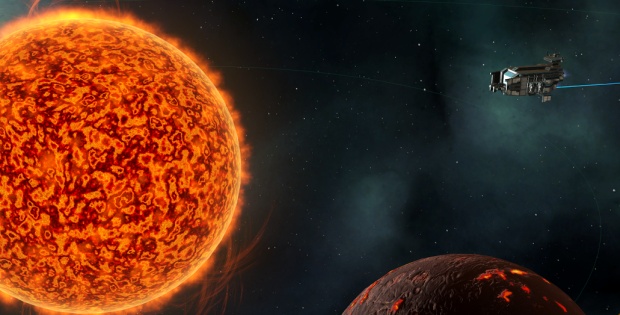
That’s when you may be able to form or become part of a galactic federation. You’ll also be dealing with trade, alliances, federations and border control, but federations offer grander possibilities. They are led by a president, elected from the member civilisations at regular intervals, and that player (or AI) has control of all foreign policy and of the federation fleet. When you design the ships for that fleet you have access to all the modules from every race in the federation, allowing for combinations unavailable elsewhere. Whether you choose to build a peacekeeping force, an ambassadorial outreach program or a terrifying overpowered fleet of battleships is entirely your choice, but it’s wise to keep in mind that you may lose the next election and cede control of your creations to another leader.
Ships are customisable but the creation tools aren’t a central feature. Individual ships can be seen on the map though and, in another first for Paradox, every unit can be seen during combat. There’s no direct control of the tactical situation but you’ll be able to see how your designs and combinations perform, and the debris left behind after combat can be scanned and analysed by science ships.
Science is another example of Paradox tearing up the 4X script and science ships are one facet of the design. They behave like a hero unit, physically existing within the game world and conducting missions. That might involve visiting planets that sensors have detected but know little of, or exploring blackholes and other anomalies. New discoveries have a difficulty rating and if the scientist fails to understand, the secrets are lost forever. There are greater risks, however – a catastrophic failure might send an asteroid plummeting out of orbit and toward an inhabited planet, or destroy the ship, killing the scientist on board. You might even lose a scientist only to find that he is still alive but stricken with wanderlust or that he has lost his mind while confronting some terrible mystery. Brilliantly, a scientist who has attempted to understand the unfathomable may gain traits that reflect his exposure to horrors beyond comprehension. Those same traits might make his life miserable but they could also be the key to unlocking some of the more esoteric and dangerous technologies available in the game.
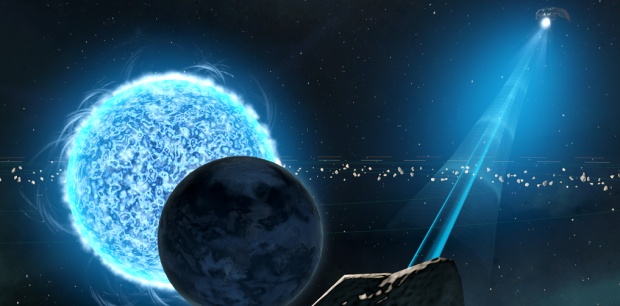
Those technologies are not contained within a tree. The system is similar to a deck of cards, with three departments – physics, social and engineering – each with a character placed in charge of discoveries in that sphere. When a piece of research has been completed, three cards will be presented to choose between. The techs offered are semi-random but their availability is heavily weighted by the ethics of your empire, as well as the skills and traits of the scientist in charge of the department. As with the alien races and the process of discovering the wonders of the universe, research is mysterious and is directed by the character of your empire, and the personality and skills of specific characters.
Conquest works as in other Paradox strategy games. Rather than winning a battle and taking the spoils, you’ll need to negotiate peace agreements that cede control of colonies. The way that fleets move around the map is wholly different, however. There are three forms of faster-than-light travel and each species chooses one at the beginning of the game. Hyperlanes connect systems directly but those who use them are tied to the existing layout, turning the map into a series of nodes. Travelling through the warp is slower but provides freedom of movement. Wormholes require stations, constructed at the edge of systems, but allow for long jumps.
In the end-game, when the focus shifts again, that first choice of FTL mode may come to the fore again. Now, with empires locked into wars and alliances, new layers of the game become active. Central to this is the fact that scientific discoveries are rarely complete. Rather than ticking off each planet and anomaly that you find, you’ll be able to increase your knowledge as you research new scanning technologies. Even your home planet may have secrets that only reveal themselves late in the game, when the correct technology is in place.
Every species has a backstory and as your power increases, so will your ability to explore your own prehistory. You may find that there was a precursor race that seeded life through the galaxy or that your people are the remnants of an empire that once ruled the systems that you’re now unwittingly reclaiming. As with the rest of the design, the end-game is engineered to reward the curious, introducing unexpected stories and concepts.
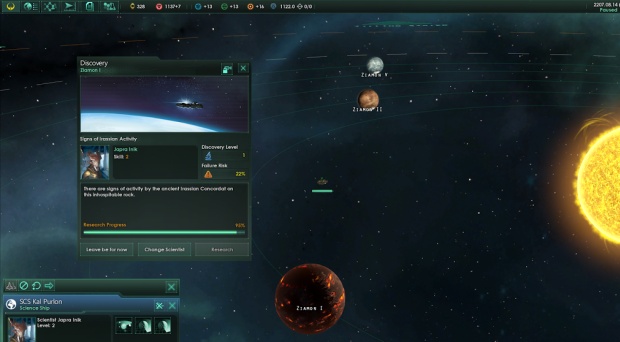
Most exciting of all is the possibility of late-game catastrophes that change the entire nature of the galaxy. Research into AI could trigger a robotic revolt and old enemies may have to work together to contain the new threat. Those attuned to the warp may find that chaotic beings have been paying close attention to their tinkering with the thin fabric of reality. If that fabric were to tear, unimaginable horrors might spill through.
These events are the result of the actions of civilisations. The empire that concentrates on research and attempts to defuse hostilities at every turn may eventually become the undoing of the entire galaxy by probing too far and too deep. But nothing is certain – on another day, in another timeline, they may create the perfect society thay have been working toward for centuries.
There’s so much more: observation posts to monitor planetbound species, either non-aggressively or with added abductions and invasive surgeries; pre-sentient species that can be genetically modified and controlled; genocide and enslavement.
Most of the systems are already in place and the game is already in late alpha. I once spoke to Fåhraeus about the possibility of a single game that combined Paradox’s big four – Crusader Kings, Europa Universalis, Victoria and Hearts of Iron. At the time, he said it would be a dream project but the shifts in focus and design required for different eras would be incredibly difficult to accomplish effectively.
Perhaps even then he had realised that history was not the right canvas and was already looking to the stars, because Stellaris may be that dream project. If Stellaris combines the character- and story-led strategy gaming of Crusader Kings with the randomised mysteries of an infinity of worlds, it will be an astonishing creation. If the movement from exploration to empire and eventual crisis is effective, it could be Paradox’s finest hour, and a landmark in the development of both 4X and grand strategy design.


Sounds way more ambitious.
It may sound but it's not.
All you will have in-game is events like in ck2 or eu4 and you will have to click 'yes' or 'no' and then the game will crash due to pdox coding.
Sounds way more ambitious than anything pdox has managed to pull off in the past. Expecting features to getsold as DLC like they were always intended toaxed, mechanics to be superficial and tons of bugs.








